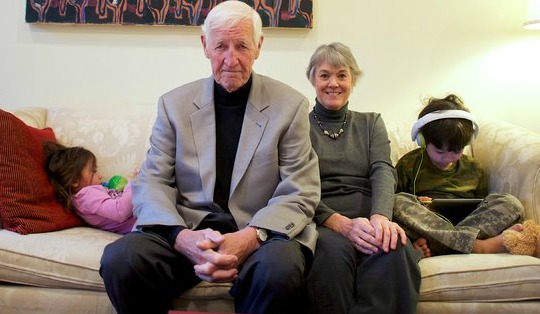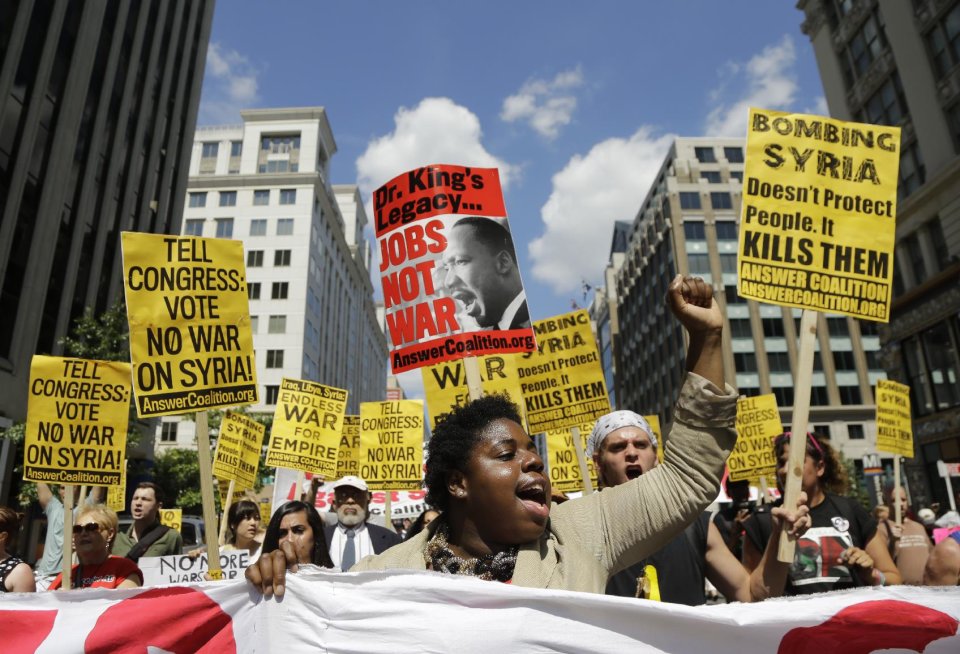“If the court’s ruling is correct, the government has unreviewable authority to carry out the targeted killing of any American, anywhere, whom the president deems to be a threat to the nation,” explained ACLU lawyer Jameel Jaffer (CNN, 12/7/10).
A little over a month later, Obama hosted a state dinner for President Hu Jintao of China—an event “highly choreographed,” supposedly, to raise human rights concerns, according to Voice of America (1/24/11). The dinner was to take place on the heels of a joint news conference in which Obama “gently but pointedly prodded China to make progress on human rights,” wrote the New York Times (12/19/11) unquestioningly.
Emerging as a victor in an “intense winnowing-down process by a White House confronted by some of the toughest jockeying for invitations in recent memory” (New York Times, 1/19/11), Human Rights Watch executive director Kenneth Roth arrived at the function, which also hosted the leaders of Microsoft, Boeing, Goldman Sachs, JP-Morgan Chase and Disney. (The administration also aimed to “press China to open its markets to goods made by American companies,” reported the Times.)
Roth saw a nobler rationale for his own presence: “I knew that I was being used as a symbol—to signal a tougher approach on human rights,” he wrote in the L.A. Times (1/23/11), and he took on his US-appointed role with gusto.
President Hu, said Roth (VOA, 1/24/11), “was frankly my most important target, if you will, when I went into the White House.” Roth was “pleasantly surprised” to be “seated in the main State Dining Room” where, “with the Obama administration’s backing, I had been able to explain to a senior Chinese official why his government’s treatment of [political prisoner] Liu [Xiaobo] was a clear violation of the right to freedom of expression” (L.A. Times, 1/23/11).
Roth concluded, “I had a chance to chat further with Obama. I thanked him for being more outspoken on human rights in China and for finding a way to discuss the issue that was genuine and heartfelt.”
How was the president—who just weeks prior had employed a “state secrets” justification for his right to maintain a covert kill list—so easily able to recruit the head of a self-described “independent” nonprofit to use human rights as part of an event contrived to advance US interests? Put another way, if New York City-based HRW were instead headquartered in 1970s-era Santiago, Chile, when that government similarly administered an international assassination program, would HRW expect its denunciations of Soviet human rights abuses at Pinochet’s behest to be taken seriously?
Part of the answer for Roth’s dutiful performance rests with Human Rights Watch’s institutional history, whose Cold War framework fit well with Obama’s task for the group. HRW’s first incarnation in 1978, as Helsinki Watch, was “designed to support the citizens groups formed throughout the Soviet bloc” and engage in “publicly ‘naming and shaming’ abusive governments” throughout “the Soviet Union and Eastern Europe” (“Our History,” HRW.org).
But a second reason lies in HRW’s present-day conflicts of interest, which contribute to a culture of normalizing and accommodating the extreme power that the United States arrogates to itself. Only under such a worldview could President Obama have the moral standing to advocate for human rights improvements in China—a country whose head of state could never maintain a secret international extrajudicial kill list, for example.
HRW’s ties to US power were publicly criticized in a campaign launched in May: Two Nobel Peace Prize laureates and over 100 scholars, lawyers, journalists and current and former United Nations officials submitted an open letter to Roth that I organized, detailing HRW’s revolving door to human rights–abusing arms of the US government, and instances of inconsistent advocacy that suggested an unhealthily close relationship to US power (AlterNet, 5/12/14).
The letter noted that HRW’s former Washington advocacy director, Tom Malinowski, had previously been a special assistant to President Bill Clinton, and that he left HRW to serve as an assistant secretary of State for Obama. Miguel Díaz, prior to his eight years on HRW’s advisory committee for Latin America, had worked as a CIA analyst. “Now at the State Department,” we wrote, Díaz’s official role is to serve as “an interlocutor between the intelligence community and nongovernment experts.”
The letter highlighted some of HRW’s questionable advocacy. Malinowski, for example, had once publicly argued (L.A. Times 2/1/09) that there was “a legitimate place” for CIA renditions. And HRW (HRW.org, 11/9/12) had strongly criticized Venezuela for its candidacy to the UN Human Rights Council in 2012, but at “no point has US membership in the same council merited censure from HRW, despite Washington’s secret, global assassination program, its preservation of renditions, and its illegal detention of individuals at Guantánamo Bay,” the letter read.
Roth dismissed the effort, writing that the signatories’ “concern is misplaced” (HRW.org, 6/3/14). In a debate on Democracy Now! (6/11/14), HRW counsel and spokesperson Reed Brody echoed Roth in claiming that there was “really no basis to this kind of allegation.”
A follow-up on behalf of the Nobel laureates and former UN officials reaffirmed the original concerns. The rebuttal cited yet another instance of an HRW staffer moving to the State Department—just one week after Roth’s receipt of the first letter. In this case, a senior HRW researcher was transitioning to the office of the US Ambassador to the UN Samantha Power, who had promised in her confirmation hearing to “never apologize for America” (AlterNet, 5/12/14).
This rebuttal advocated for lengthy “cooling-off” periods before and after HRW associates work in the foreign-policy divisions of the US government, and criticized both Roth and Malinowski for engaging in pro-war advocacy in the cases of Syria (Twitter, 6/10/14) and Libya (New Republic, 3/27/11; Foreign Policy, 10/2/12), respectively, in apparent violation of HRW’s policy of neutrality on such matters.
The letter to Roth also concluded that HRW should remove from its board of directors Javier Solana, the ex-NATO secretary general who initiated an illegal war on Yugoslavia and presided over such atrocities as the deliberate bombing of a television station, which killed over a dozen civilians (Extra!, 6/99).
While HRW did not respond officially, HRW associates close to one of the letter’s signatories, Richard Falk, exerted private pressure on the Princeton law scholar and ex-UN special rapporteur on Palestinian human rights to withdraw his signature. He refused.
While generating substantial debate within progressive spheres, the effort for greater accountability from HRW was almost uniformly ignored by the corporate media, with the exception of a stray op-ed in the Boston Globe (5/24/14). This perhaps reflected the cultural similarities between the influential human rights group and the establishment press. Within corporate media, proximity to political power is generally viewed positively, and conflicts of interest are endemic.
As FAIR (FAIR Blog, 12/16/13) has documented, the prestigious news program 60 Minutes retained correspondent John Miller, who has shuttled back and forth between police and intelligence work and journalism throughout his career. His prior professional experience in the office of the Director of National Intelligence and as assistant director of public affairs for the FBI have repeatedly raised questions about the favorable portrayals of the national security officials he has interviewed for the show. Miller later re-entered the revolving door to become the New York Police Department’s top intelligence and counterterrorism official.
The New York Times, for its part, denied that its Jerusalem bureau chief Ethan Bronner had a conflict of interest when it was discovered that his son was actively serving in the US-backed Israeli Defense Forces (Extra!, 4/10). FAIR Action Alerts (5/16/12, 9/26/13) subsequently targeted the New York Times and the Washington Post—whose owner incidentally benefits from lucrative CIA contracts (Extra!, 3/14) —for allowing their Jerusalem bureau reporters’ spouses to engage in paid, pro-Israeli government advocacy.
Their revolving doors and conflicts of interest help lead both the media and HRW to inhabit the worldview of US “exceptionalism”: the notion that the country is benevolent and noble, that it genuinely pursues human rights and needs to play a more active role in world affairs. This ideology explains how both the Times and HRW can promote themselves as combative and fiercely independent counterparts to the state—while operating firmly within the acceptable parameters dictated by US priorities.
The discordant reality behind the “exceptionalism” myth is that the rest of the planet sees the United States as “the greatest threat to peace in the world today,” according to a global poll. The second runner-up, Pakistan, received a third as many responses (BBC, 12/30/13).
So when Roth expressed to VOA that he “frankly was very grateful” to the “people in the White House” for arranging his encounter with Chinese officials at the state dinner, and applauded the administration for “stay[ing] true to its values” and promoting a “more serious approach to human rights,” he was demonstrating that HRW’s approach to human rights is more that of a lapdog than a watchdog.









 ZDF
ZDF